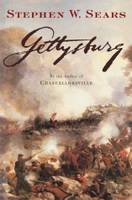
Upon visiting the Gettysburg battlefield in July, I was struck by something I always knew, but the prophetic significance of it did not strike me until touring the actual battlefield.
First of all, the Civil War battle known as "Gettysburg" was the turining point of the American Civil War. It occurred over a period of three days; July 1 to July 3 1863, with the Confederate forces leaving the field late in the evening of July 4th. Up to this time, the Confederate army won every single battle in which it was engaged.
On the end of the first day of the battle until the withdrawal of Confederate forces late on July 4th, the two armies held two north-south ridge lines that ran near the town of Gettysburg.
The Confederate forces held a ridge line called Seminary Ridge just to the west of Gettysburg. It was called Seminary Ridge due to a Lutheran Seminary that occupied the north end of the ridge line.
The Union forces held a ridge line called Cemetery Ridge that was located a little to the south of the town of Gettysburg. It was called Cemetery Ridge due to a cemetery on the north end of the ridge located on a prominent hill called Cemetery Hill. The ridge line ran south from Cemetery Hill and terminated at the foot of another hill called Little Round Top.
So, in a strange twist of divine providence, the Confederates were holding the Seminary, while the Union forces were aligned with the Cemetery!
There are some tart little jokes amongst evangelical Christians referring to seminaries as cemeteries because there are many stories of people actually loosing their faith while attending seminary, especially the more liberal ones. Here at Gettysburg, back in 1863, the punchline of an old joke was an actual battle.
Though I knew about these ridges and their names for many years, it wasn't until I actually visited the battlefield that the blinders were removed, and I first realized the tremendous irony of the names.
Cemetery Hill, Cemetery Ridge and Little Round Top were "high ground" in that they offered a nice view of the surrounding countryside. They were higher in elevation than Seminary Ridge. High ground is advantageous in warfare in that one can easily see and make out enemy formations and movements, and take appropriate action to counter their attacks. It is also difficult for infantry to attack up hill, hence winners and losers in the battle of old were often decided by those who held on to the "high ground."
The turning point of the battle, and the "high tide" of the cause of the Confederacy was an attack known as "Pickett's Charge." In this attack, 15,000 Southern soldiers left the relative safety of Seminary Ridge, and attacked the Federal positions along Cemetery Ridge.
The charge was an overwhelming failure, with the South sustaining tremendous casualties, and the Northern troops standing victorious for the first time during two years of Civil War. The 'Cemetery' prevailed over the 'Seminary.'
On July 3rd the Federal troops stood on Cemetery Ridge and the adjoining hills, waiting for the attack they knew would come. They fought a purely defensive battle, allowing the forces of the Confederacy to do all the maneuvering and attacking. While the Southerners enjoyed some small success on the second day of the battle (July 2nd), all they had gained was completely lost on the third day, July 3rd, when General George Pickett took his men into battle in one of the most famous infantry charges in history.
The prophetic lesson I learned is a simple one: the cemetery is stronger than the seminary. In other words, death is stronger than theology. No matter how good, how strong your theology is, the cemetery will still prevail. In fact, death will do more to straighten out one's theology than all the systematic theological text books ever written. Perhaps that's the reason why my favorite theologian is Thomas Aquinas, who after seeing a powerful vision of heaven while in prayer, knew that his best theological works were as straw, and stopped writing theology text books.
Now as Christians we know that there is life after death, but only
after death. We still must experience the pain of death before enjoying the benefits of new life. The Lord once told me that theology is preparation for death, and the best theology is the one that best prepares a person to die, and die well.
Here in the 21st century, "dying well" sounds like a rather pessimistic idea, but in the early days of Christianity, "dying well" was a powerful evangelical tool! It is said many ancient people were converted simply by watching how well Christians met horrible deaths at the hands of the Romans.
Today's church has all but abandoned the idea of preparing us to "die well." There are plans and programs for just about every aspect of life, except for death! It is assumed that we will persevere unto death, but little is done to instruct or encourage the sheep to plan for the long term. (other than the finance ministries, but that's another story...)
The truth of the battle of Gettysburg is a lasting lesson for those who have ears to hear. No matter how much instruction we've had in theological matters, death is still the ultimate reality we must face, and the ultimate test of our theology. I have come to the realization that a lot of bad theology and theological ideas is caused when we lose site of this simple, obvious truth.
A good name is better than fine perfume,
and the day of death better than the day of birth.
It is better to go to a house of mourning
than to go to a house of feasting,
for death is the destiny of every man;
the living should take this to heart.
Sorrow is better than laughter,
because a sad face is good for the heart.
The heart of the wise is in the house of mourning,
but the heart of fools is in the house of pleasure.
--Ecclesiastes 7:1-4 NIV













